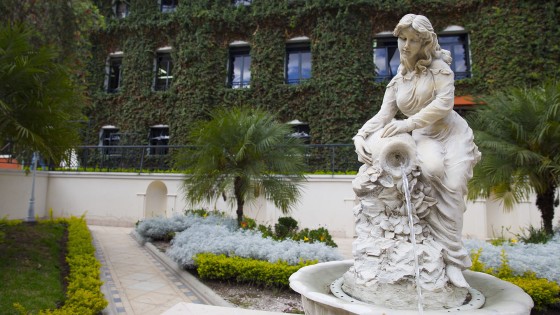College of General Studies
Liberal Arts are the essence of the USFQ’s educational philosophy. The term Liberal Arts refers to the disciplines that liberate the human being, that impel him/her to realize him/herself and to develop his/her capacities. They are a way of conceiving education that gives the student freedom of action and gives him/her the opportunity to achieve his/her human potential. From the curricular point of view, they are characterized by a wide approach, by their openness to diverse disciplines. As a pedagogical method, they consider the student not as a mere recipient of information, but, and above all, as a human being who is stimulated to think, act, question and doubt. All this through a constant dialogue.
A fundamental component of the liberal arts, the emblematic educational philosophy of the USFQ, is the College of General Studies.
The mission of the College of General Studies is to form creative, critical, curious, motivated and free-thinking students. Enterprising, self-reflective, informed, and responsible citizens. We prepare them to be agents of change and leaders not only in their profession but also in their social context, so that they can successfully face the constant changes and complexity of contemporary society, as well as the new challenges that arise in their academic life.
Through the College of General Studies, students explore different branches of knowledge, which allows them to acquire a comprehensive formation and to complement and expand the parameters of their specific areas of study. The General College curriculum is common to all USFQ careers with slight variations as far as health sciences college students are concerned. It includes courses in the areas of Management, Arts, Social Sciences, Biological Sciences, Academic Composition in Spanish, academic colloquiums and conferences, two semesters in sports, Economics, the passing of seven levels of English plus the class of composition and rhetoric in English, credits related to academic research in English, Philosophy, Mathematics, Computing, Global Gastronomic Culture, self-knowledge and relationship credits with the history of humanity and the evolution of the cosmos with a Socratic approach, 150 hours of community service, 2 months of work internship, and finally free elective credits.
The students, advised by their directors or career tutors, must take credits each semester belonging to their undergraduate curriculum as well as those previously mentioned from the General College. It is recommended that the credits of the preparatory classes and the hours of community practices be taken starting in the second year and those corresponding to professional practices before beginning the last year of the degree. Information on processes, policies and regulations can be found in the Student Handbook found at the link:
For your information
- It is important that you alternate the General Studies subjects with those of your career in the first years, according to the suggested sequence of your academic grid.
- General Studies subjects are as important as those of your major, do not leave them until the end of your degree and keep in mind that you cannot have more than 3 registrations in one subject.
- If you have been exempted from a subject, you must recover those credits by taking another course, so that the final sum of credits is not affected.
- The free elective courses give you the opportunity to explore an academic area different from that of your career. Review the subspecializations offered in other areas so that you can take advantage of those courses as part of this requirement.
- You cannot use as free electives courses that are on your academic record.
- For the English requirement you can choose any course with an E code, remember that the prerequisite is Composition and Rhetoric or Writing and Rhetoric.
- The levels of English can be passed by taking the courses or by the proficiency exam.
- It is recommended that you do the community practice hours from the second year of the career and the professional ones before starting the last year.
- Periodically review your compliance with the requirements of College of General Studies with your academic transcripts (kardex).
- This and more information about processes, policies and regulations, can be found in the Student Handbook. You can access it by going to the USFQ web page
- If you have any questions, please contact the following people::

